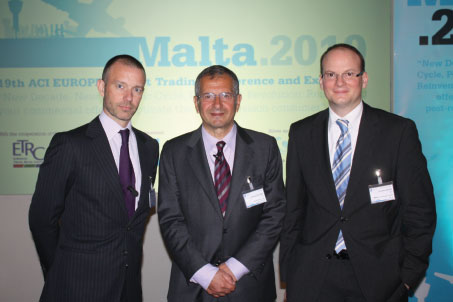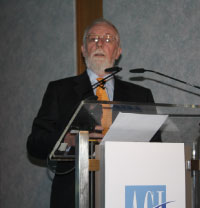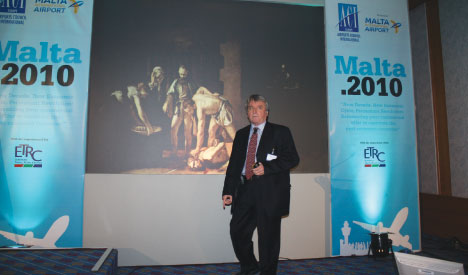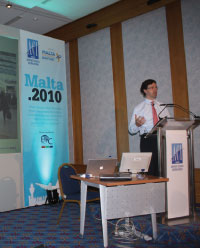
Commercial revenues are vital both as an increasingly important element of the airport business and an integral part of the passenger experience. As a proportion of airports’ overall income, non-aeronautical revenues are growing at airports of all sizes; they help airports maintain competitiveness and contribute towards financing capital expenditure plans. The impressive attendance of 250 delegates – all the more so, given the disruption caused by the volcanic ash crisis the week before – is testament to the fundamental role of commercial revenues.
ACI EUROPE Director General Olivier Jankovec, having spent several days in high-level negotiations regarding the volcanic ash crisis, gave an impressively detailed analysis of its impacts. Industry relief measures, he said, must apply to all stakeholders, including airports and their commercial partners. In terms of airport retail, Generation Research estimated lost sales in Europe to be in excess of €25 million per day during the six-day shutdown.

Olivier Jankovec, Director General, ACI EUROPE; Gerald Ratner; and Julian Jaeger, CEO, Malta International Airport.
The conference identified the immediate industry threats as being WHO proposals to ban duty free sales of liquor and tobacco, cabin bag restrictions and security, particularly in terms of the timetable set for the removal of liquids, aerosols and gels (LAGs) restrictions.

O’Connell explained that the one cabin bag rule imposed by low-cost carriers prohibits passengers from taking airside purchases on board and has created significant confusion, as implementation has been patchy.
ACI EUROPE, ETRC and IATA launched an effective lobbying campaign against the WHO Framework Convention on Tobacco Control. In an engaging presentation, ETRC President Frank O’Connell outlined the key message: “Allegations that duty free/travel value retail sales of tobacco contribute to illicit trade are unfounded. It is wholly inappropriate to include a proposal to ban these sales within a protocol to the FCTC.”
While the industry has collectively worked together for the common good on the issue, the threat to duty free tobacco sales remains. O’Connell explained that a Conference of the Contracting Parties will take place in Uruguay in November 2010. “Industry needs to maintain the global lobbying campaign. There is no room for any complacency,” he said.
In December 2009, the WHO published a draft ‘Global Strategy to reduce the harmful use of alcohol’. Both Jankovec and O’Connell referred to the success in lobbying for the removal of the reference to duty free at a meeting of the WHO Executive Board in January 2010.
Restrictions on the carriage of LAGs through EU airports will be lifted via a two-stage process, which means that from 29 April 2011 any traveller arriving in the EU carrying duty free LAGs sealed inside a secure tamper evident bag (STEB) that meets ICAO specifications, and with a receipt that shows it was purchased within the last 36 hours, can freely transfer within any airport in the EU. ACI EUROPE and ETRC have created a working group to ensure smooth transition to the new system. However, the circumstances and timeline are very challenging – LAGs screening equipment must be purchased and integrated into the screening process, yet there is no European certification system for such machines.
O’Connell explained that the one cabin bag rule imposed by low-cost carriers prohibits passengers from taking airside purchases on board and has created significant confusion, as implementation has been patchy. “Uncertainty seriously inhibits retail activity by passengers,” he said. ACI EUROPE’s Recommended Practices were agreed in January 2010 and O’Connell commented that airports urgently need to implement these to protect their retail revenues.

Woods delivered the Day Two Keynote Address with an insight into how lateral thinking can solve business challenges.
From riches to rags… and back again
The Day One Keynote Address was delivered by Gerald Ratner, formerly a hugely successful jewellery retailer, whose famous gaffe in calling his products “total crap” saw him lose everything. He is enjoying renewed success through a new online business – geraldonline.com. He gave an enlightening presentation with unique lessons on the journey from riches to rags and back to riches again, offering perspectives from both the high street and internet retailing.

Holland-Kaye offered his vision of the scope for revolution in airport retail, emphasising the importance of “range, quality and value”.
Joseph G Woods, certified de Bono trainer, Minding International, The Edward de Bono Centre for Strategic Innovation and Creativity, and Manager for Innovation, The World Centre for New Thinking, delivered the Day Two Keynote Address with an insight into how lateral thinking can solve business challenges. He said we are in a period of mass innovation – that the emerging global paradigm is “the innovation society”. He is a strong proponent of creative thinking in a time of globalisation, competitiveness and innovation.
Turning to the host of the event, Malta International Airport’s recent retail expansion is an excellent example of an airport recognising the growing need to invest and focus on the non-aeronautical sector to enhance revenue streams. CEO Julian Jaeger presented a case study highlighting that following Malta’s entry into the Schengen zone in 2008, a major redesign of facilities was needed. This provided the opportunity to make use of space not previously utilised. The airside retail area was increased by 49% to more than 2,000sqm, while the landside retail area grew from 175sqm to 677sqm. Jaeger explained that Nuance, the airport’s main retail partner, doubled its retail area and more international brands were introduced. He said that the concession fee negotiated increased from 7% to 50%, partly even in the core categories, and the total airside minimum guarantee tripled.
Quality, value and innovation
John Holland-Kaye, commercial director, BAA, offered his vision of the scope for revolution in airport retail. The keywords to emerge from his presentation were “range, quality and value”. He was forthright in asserting the importance of effectively managing passengers’ time: “Queuing is theft!” He emphasised that “airport shopping is an optional extra” and referred to the importance of customer service and offering better value than the high street. BAA’s strategy appears to have worked – it enjoyed its best ever year in 2009, with spend-per-head up by more than 10%.
SEA Aeroporti di Milano has developed the innovative SEAMI Loyalty Program to support its airport commercial activities. Vittorino Capobianco, Partnerships Development & Loyalty Programme, SEA Aeroporti di Milano, explained that it is consistent with the operator’s evolving plans to generate additional non-aviation revenues. The programme was launched in October 2009 with a simple concept: the more travellers spend at the Milan airports, the more points they earn and the greater rewards. “They earn 10 SEA points for every €1 they spend at the airports’ participating shops, bars and restaurants, car rental and car parks. They can then choose from a range of rewards, benefits and airport services,” explained Capobianco. The programme also utilises the latest technologies to improve passengers’ airport experience; RFID technology speeds-up the security process with a fast-track option and simplifies use of the Milan airports’ parking system, with no parking ticket needed. “All airport tenants are key partners in the SEAMI Loyalty Program and are involved in a very close process offering promotions to customers on a regular basis,” said Capobianco.
From humble beginnings at Shannon Airport in Ireland in 1947, travel retail has evolved into a €30 billion global industry. Duty free and travel retail operations now provide the main source of non-aeronautical revenues to airports. The 19th ACI EUROPE Airport Trading Conference and Exhibition highlighted the threats posed by excessive regulation and government moves to restrict the display and availability of certain product categories, as well as some of the innovative strategies being employed by Europe’s airport operators. Airports and retailers need to collaborate to ensure continued prosperity.







